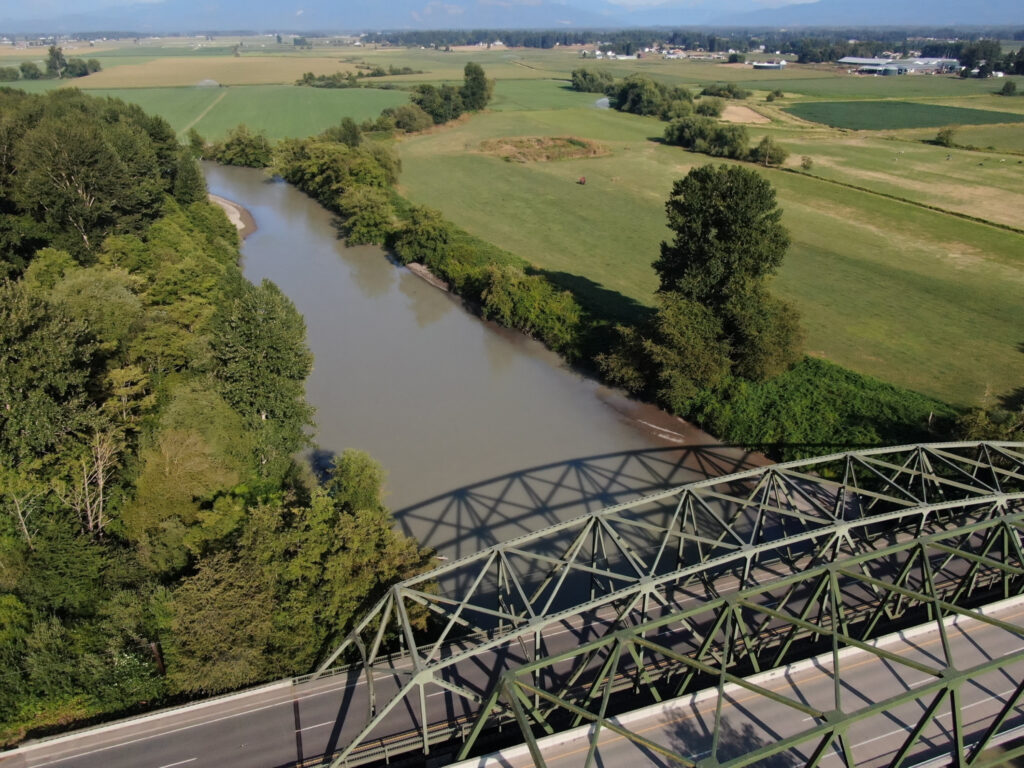Farmers and others in Whatcom County want Gov. Inslee and British Columbia officials to help solve the pollution problems in the Nooksack River watershed.
by Laurel Demkovich / Washington State Standard / June 10, 2023
The Nooksack River basin is getting sullied with a type of bacteria found in poop, and concerned residents and groups in northwest Washington’s Whatcom County are blaming Canada.
Farmers in the county, along with the North Lynden Watershed Improvement District and the Whatcom Clean Water Program are calling on Washington and British Columbia leaders to work together to find a fix.
In a letter to Gov. Jay Inslee and B.C. Premier David Eby, farmers wrote that water contaminated with “extremely high levels of bacteria” is crossing the Canadian border and draining into the Nooksack basin, posing a pollution threat to the Portage Bay shellfish beds of the Lummi Nation and raising other health concerns.
“Something needs to happen, and something needs to change,” Fred Likkel, executive director of Whatcom Family Farmers, said.
Water quality standards from the U.S. Environmental Protection Agency set a maximum threshold of 200 counts of the fecal coliform bacteria per 100 milliliters of water. Recent testing by Whatcom County and the state Department of Agriculture found samples at 10,000 or 20,000 counts per 100 milliliters. One sample was 52,000.
A memo from the Whatcom Clean Water Program, a partnership of federal, state and local organizations, said there are three permitted facilities in British Columbia near the watershed: a mushroom growing site, a composting service and a soil blending facility. But it’s unclear if these facilities are the culprits contributing to the contaminated discharge because there’s not enough sampling work being done across the border.
In their memo, the group asked the state Department of Ecology and the Puget Sound Partnership, a state agency dedicated to restoring the Puget Sound, for help creating a complaint process for British Columbia to use to respond to reports of high contamination here in Washington. It also asked the state to dedicate an ongoing program to identifying ways to proactively improve water quality in transboundary watersheds.
In the letter to Inslee and Eby, the farming group asked the governor’s office to meet with key leaders from both sides of the border to come up with next steps.
Mike Faulk, a spokesperson for Inslee, said the governor’s office plans to schedule a meeting with the letter writers soon to hear more.
“We share the concerns about high levels of fecal bacteria in the Nooksack River Basin and how that’s affecting water quality, shellfish and the broader river ecosystem,” he wrote in an email.
Faulk said Ecology is engaged with the B.C. Ministry of Environment and Climate Change Strategy on how to continue previous partnerships to address the issues.
In 2018, state and province officials formed the British Columbia-Washington Nooksack River Transboundary Technical Collaboration Group, a three-year project to coordinate work on reducing bacteria in the watershed. Likkel said water quality improved during those years, but now that the group has disbanded, bacteria is on the rise.
In an emailed statement, the Ministry of Environment and Climate Change Strategy said it continues to share water monitoring results and data assessments with Washington, despite the work group no longer being active.
“The protection of waterways is a key concern to people on both sides of the border, and B.C. is committed to working collaboratively with both state and federal U.S. agencies to manage water quality in shared waterways,” the statement read.
As part of its work, the ministry said it recently completed a “compliance blitz” of agricultural operations in the Fraser Valley, which could be contributing to the pollution. The results are expected in the coming weeks.
“The province, through the ministry, will continue to provide the resources necessary to carry on this important work,” the statement read.
Likkel said there’s always been a challenge at the end of the river where the shellfish beds lie. For many years, it was dairy farmers in Whatcom County causing bacteria to get into the water. Manure spread on agricultural fields and other animal waste can be sources of it.
Farmers have made significant changes to their operations, said Albert de Boer, who serves as the vice chair of the Portage Bay Shellfish Protection District Advisory Committee. Still, spikes in bacteria, particularly at border sampling sites, remain.
“There’s only so much we can do if we’re getting super dirty water,” Likkel said.
The bacteria detected at border sampling stations is entering Whatcom County waterways through Pepin Creek in Canada, according to the letter, but Likkel said it’s difficult to tell exactly where it’s coming from.
De Boer said farms, urban areas, stormwater drains and septic systems could all be possible contributors. Without more testing in Canada, it’s hard to know the source.
“We could probably pinpoint it if the government works with us, but we don’t have the control in our area,” he said.
The biggest threat from the bacteria in Washington is to the Portage Bay shellfish beds used by the Lummi Nation. The beds are already closed from September through December each year because of concerns over poor water quality.
But shellfish beds often offer warning signs for environmental impacts elsewhere, said Christine Woodward, who serves as the chair of the Portage Bay Shellfish Protection District Advisory Committee.
The contamination not only affects shellfish and the indigenous rights of the Lummi Nation, but also anyone who has access to the river and its tributaries, Woodward said.
“It’s a health issue,” she said.
FEATURED IMAGE: Aerial view of bridge over the Nooksack River in Washington, on August 7, 2019. (U.S. Department of Agriculture)
Washington State Standard is part of States Newsroom, a network of news bureaus supported by grants and a coalition of donors as a 501c(3) public charity. Washington State Standard maintains editorial independence. Contact Editor Bill Lucia for questions: info@washingtonstatestandard.com. Follow Washington State Standard on Facebook and Twitter.



